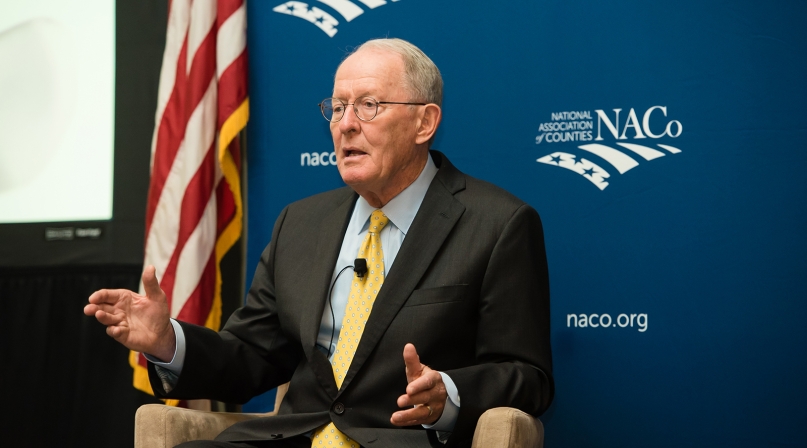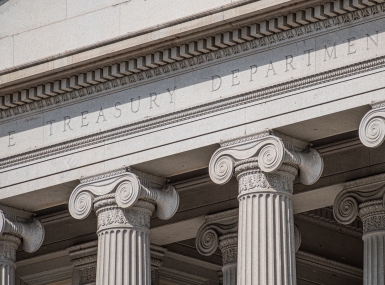Ruling on internet sales tax ‘big deal for counties,’ Sen. Alexander says

Key Takeaways
The Supreme Court’s recent decision to allow the collection of taxes on internet purchases “is a big deal for counties…and for Main Street businesses, which are under a whole lot of pressure for a variety of reasons,” Sen. Lamar Alexander (R-Tenn.) said during an interview with County News.
Alexander discussed that and other issues July 14, when he also addressed members of the Large Urban County Caucus and Rural Action Caucus at the NACo Annual Conference in Davidson County, Tenn.
Serving in the Senate since 2003, Alexander, 78, is also a former U.S. education secretary and served as governor of Tennessee from 1979 to 1987.
Alexander chairs the Committee on Health, Education, Labor and Pensions and also serves on the Appropriations, Energy and Natural Resources and Rules and Administration committees. Alexander was born and raised in Blount County, Tenn.
The Supreme Court’s recent decision to allow the collection of taxes on internet purchases (See County News, June 21 “Supreme Court gives OK to collecting tax on internet sales”) could mean up to $26 billion a year that counties and states could use to keep tax rates down or to pay for local roads, education or public health, Alexander said.
Collecting the taxes “has needed to be done for a long time,” he said, “because it wasn’t right for the federal government to force states not to collect taxes from out-of-state sellers in the same way that states and counties collected taxes from in-state sellers. That hurts the Main Street businesses in small towns across America and big towns across America.”
Alexander also said it was unfair to the taxpayers who have been paying taxes on internet purchases while others did not.
“It’s one of the biggest things that’s happened to local governments in a long time,” he said. Alexander said that to ensure that those new taxes are collected, states and counties need to streamline their procedures for collecting taxes.
As chair of the Committee on Health, Education, Labor and Pensions, he weighed in on a continuing concern for counties: Healthcare costs.
“We spend way too much on healthcare when compared to the rest of the world,” he said. “It’s not that we use more healthcare than other counties — it’s that the prices are higher,” he noted.
Alexander said that some of the reasons why the United States pays more include “waste, fraud, abuse and administrative costs.”
“Finding a way to reduce the administrative complexity would save money and make doctors and hospitals a lot happier, because they’re overburdened,” he said.
Alexander said the Senate is working on reauthorization of the Preparedness Act, which is a federal law “to try to make us ready for epidemics, disasters, for research on emerging epidemics…so we can step in and deal with that,” he said. “That’s very important because counties simply can’t deal with it when it comes up.”
On a day to day basis, “I think funding for community mental health centers is one way the federal government provides a lot of support for primary care and public health needs in counties,” he said.
Alexander said on the front to combat the nation’s opioid crisis, there are now 42 provisions from 38 senators on ways to deal with the situation — everything from researching non-addictive pain medicine to stopping fentanyl from coming in from China to limiting the number of pills contained in blister packs.
But “it’s not like a moon shot, it’s not like the 1960s, where the president can say ‘Let’s go to the moon, give the job to an agency’…it’s much more complicated than that,” he said.
Attachments
Related News

White House OMB releases final revisions federal Uniform Guidance (2 CFR Part 200)
The White House OMB released final revisions to the federal Uniform Guidance that outline compliance and reporting requirements for federal financial assistance.

Treasury Department releases new obligation guidance for the ARPA State and Local Fiscal Recovery Fund
On March 29, the U.S. Department of Treasury released new FAQs related to their Obligation Interim Final Rule for the ARPA Recovery Fund.

Internal Revenue Service pilots free direct tax filing program in 12 states
On March 12, the IRS launched Direct File, a new pilot through which eligible taxpayers in 12 states can file their taxes for free using a simplified tool.
